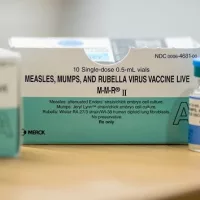
(NEW YORK) — Measles cases in the U.S. have surpassed 900 as outbreaks continue to spread across the county, according to new Centers for Disease Control and Prevention data published Friday.
A total of 935 cases have been confirmed in 29 states including Alaska, Arkansas, California, Colorado, Florida, Georgia, Hawaii, Illinois, Indiana, Kansas, Kentucky, Louisiana, Maryland, Michigan, Minnesota, Missouri, Montana, New Jersey, New Mexico, New York, Ohio, Oklahoma, Pennsylvania, Rhode Island, Tennessee, Texas, Vermont, Virginia and Washington.
At least six states including Indiana, Kansas, Michigan, New Mexico, Ohio and Texas are reporting outbreaks, meaning three or more related cases.
The CDC says 13% of measles patients in the U.S. this year have been hospitalized, the majority of whom are under age 19.
Among the nationally confirmed cases, CDC says about 96% are among people who are unvaccinated or whose vaccination status is unknown.
Meanwhile, 2% are among those who have received just one dose of the measles, mumps, rubella (MMR) vaccine and 2% are among those who received the required two doses, according to the CDC.
Dr. Conrad Fischer, chief of infectious diseases at One Brooklyn Health in New York City, told ABC News he is concerned about the growing number of cases in the U.S.
“This is a disease that was at the level of complete eradication; this should not be happening,” he said. “It’s very sad to have an enormously safe vaccine that has been used in billions of people and to have a sort of cultural societal amnesia about what these illnesses were like in the past.”
In the decade before the measles vaccine became available, the CDC estimates that 3 to 4 million in the U.S. were sickened by measles every year, about 48,000 were hospitalized and about 400 to 500 people died. About 1,000 people suffered encephalitis, which is swelling of the brain.
Measles was declared eliminated from the U.S. in 2000 due to a highly effective vaccination program, according to the CDC. But vaccination rates have been lagging in recent years, leading to an increase in cases.
In Texas, where an outbreak has been spreading in the western part of the state, at least 663 cases have been confirmed as of Tuesday, according to the Texas Department of State Health Services.
Meanwhile, officials in Denton County — in the eastern part of the state outside Dallas and Fort Worth — reported its first measles case this week in a patient who attended a Texas Rangers game.
The infected individual, an adult with unknown vaccination status, visited Globe Life Field and a handful of restaurants and other locations, Denton officials said.
Additionally, Chicago reported its first measles cases this week, one in a suburban Cook County resident with unknown vaccination status and another in an adult Chicago resident who traveled internationally and received one dose of the MMR vaccine, according to the Chicago Department of Public Health and Cook County Department of Public Health.
It comes as a WHO report this week found that cases in the Americas are 11 times higher this year than they were at the same time last year.
Six countries, including the U.S., Canada, Mexico, Argentina, Belize and Brazil, have reported a total of 2,318 cases so far this year. Last year had 205 cases at the same time.
Fischer said measles is not a benign virus and can cause serious complications, especially among vulnerable individuals such as young children and immunocompromised people.
“Measles has a chance to literally destroy your brain, to cause pneumonia, ear infections and, although it is only fatal in a relatively small number of people, it spreads so amazingly easily that even if it’s only a few percentages, it’s something extremely dangerous,” he said.
Fischer emphasized that measles is the most contagious infectious disease known to humans, even compared to other dangerous diseases like tuberculosis.
“For instance, tuberculosis will spread only to two or 3% of the people exposed,” he said. “But if you are not vaccinated and you’re exposed to someone with measles, you have a 90% chance of getting that infection.”
Dr. Whitney Harrington, a physician in the division of infectious diseases at Seattle Children’s Hospital, told ABC News the U.S. is at risk of measles becoming endemic again unless vaccination rates increase.
The CDC currently recommends that people receive two doses of the MMR vaccine, the first at ages 12 to 15 months and the second between 4 and 6 years old. One dose is 93% effective, and two doses are 97% effective against measles, the CDC says.
“We really know that vaccines are the single most important public health intervention for preventing infectious disease,” Harrington said. “And we know that they’ve dramatically decreased really the number of cases and the severity of cases of many infections, including measles.”
She encouraged parents who have not vaccinated their children yet to speak with a doctor or a health care provider about vaccination and the benefits of vaccination.
ABC News Youri’ Benadjaoud contributed to this report.
Copyright © 2025, ABC Audio. All rights reserved.














